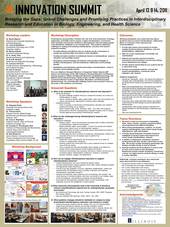Highlight
Interdisciplinary Innovation Summit - Bridging the Gaps: Grand Challenges and Promising Practices in Interdisciplinary Research and Education in Biology, Engineering, and Health Science
Achievement/Results
Producing the next generation of leaders who will work at the intersection of biology, engineering, and health science requires a highly interdisciplinary environment which educates and empowers students to take leadership roles and address global cross-disciplinary challenges in our changed world. This workshop addressed challenges in creating and sustaining interdisciplinary education and research programs.
-
Providing efficient and effective ways for students, faculty, and industry to acquire new technical skills and content in other disciplines
-
Creating innovative solutions to institutional barriers to interdisciplinary research, education, and knowledge transfer – Developing common language and effective communication strategies to facilitate interdisciplinary and inter-institutional collaboration and knowledge transfer
-
Establishing and maintaining external partnerships in interdisciplinary research, education, and knowledge transfer
Four new initiatives at the interface of nanotechnology, biology, medicine, cell mechanics, and biomaterials have recently been funded at UIUC. These programs, the Emergent Behaviors of Integrated Cellular Systems NSF Science and Technology Center, the NSF Integrative Graduate Education and Research Traineeship in Cellular and Molecular Mechanics and BioNanotechnology, the NIH Midwest Cancer Nanotechnology Training Center, and the NSF Industry/University Collaborative Research Center in Agricultural, Biomedical, and Pharmaceutical Nanotechnology, are confronting this challenge head-on and are poised to lead our University in this ambitious new direction.
Integral to these initiatives are education and research programs that include:
-
Interdisciplinary and cross-institutional research teams in biology, engineering, and health science using nanotechnology and computational tools to address the grand challenges in health and the new biology
-
A two-track graduate curriculum that prepares engineering and biology students for interdisciplinary collaboration by seamlessly integrating complementary content and technical skills into their disciplinary study, providing co-advisers, and fostering interdisciplinary
-
New experimental modules and summer workshops introducing students, post docs, and faculty to state-of-the-art equipment and laboratory procedures across disciplines
-
International research experiences (e.g., GEM4, BS/BA, National University of Singapore) for students and faculty
-
An interdisciplinary, inter-institutional graduate student council that participates in the leadership and drives the management of each program
These unique educational and research components not only have the potential to transform graduate education at our institution and our partner institutions, but also serve as empirically validated models for other interdisciplinary programs on the Illinois campus and beyond.
The workshop was comprised of panel discussions, small group discussions, a plenary session, and a multi-institutional broadcast emanating from Massachusetts Institute of Technology.
A total of 70 people registered for the workshop: 26 Faculty, 24 Students, and 20 Staff and non-UIUC participants. Welcome remarks were made by Provost Richard Wheeler and Vice Chancellor for Research Ravi Iyer. Prof. Rashid Bashir provided an overall summary and goals of the workshop. Prof. Jimmy Hsia moderated the panel discussion with members from NSF, Mayo Clinic, NIH-NCI, Elanco Animal Health, and UIUC. Two breakout sessions were held, followed by a talk on assessment and evaluation by Prof. Lizanne DeStefano.
Key recommendations included: 1. Provide appropriate metric and incentives for faculty: equalize the incentives between disciplinary work and interdisciplinary collaboration. 2. Allow for course requirements to be flexible and ‘individualized’. 3. Address the promotion and tenure barriers, instructional units and indirect cost recovery sharing across departments and colleges. 4. Provide campus seed funding for new projects that are in opportunity areas. 5. Develop more graduate academic curricula that support interdisciplinary coursework and its integration with research.
Address Goals
As a result of participation in this summit, participants were able to:
-
Understand the opportunities and grand challenges of interdisciplinary research in biology, engineering, and health science
-
Identify strategies for overcoming the institutional and intellectual barriers to interdisciplinary education and research
-
Have the tools to develop an education and evaluation plan for interdisciplinary programs







